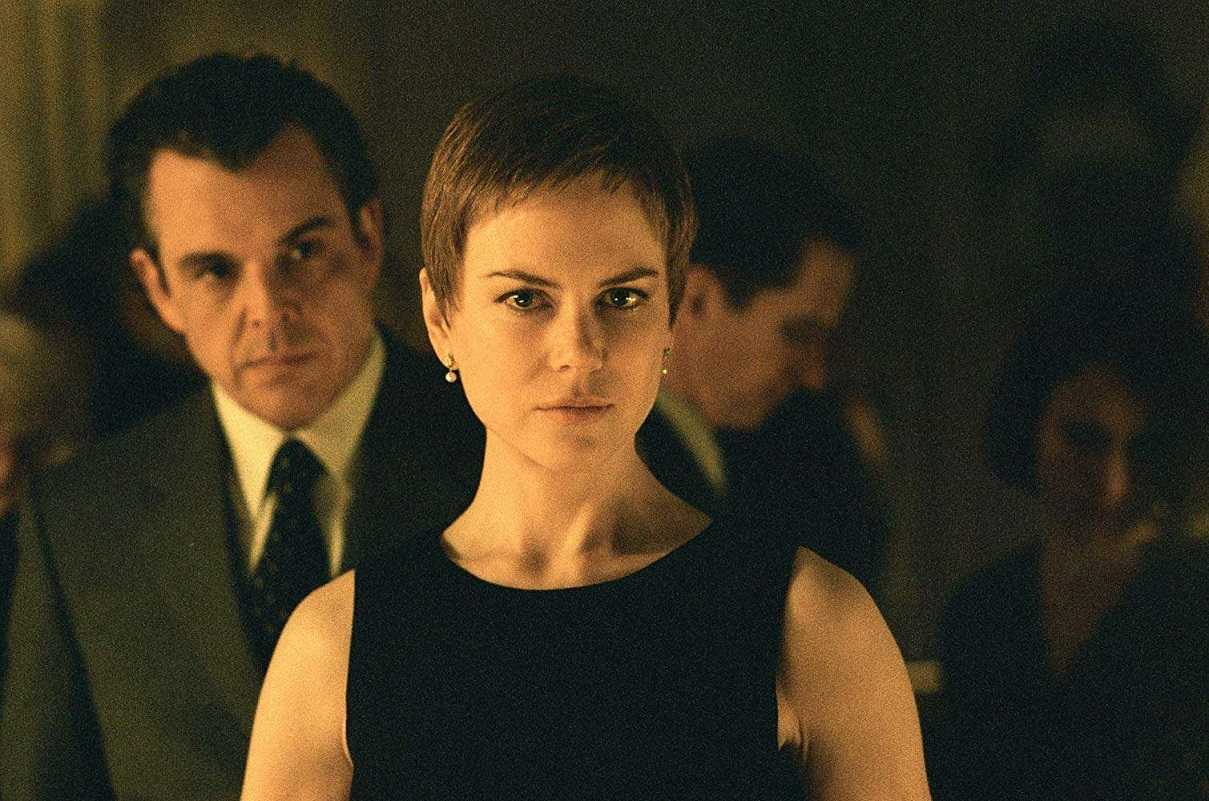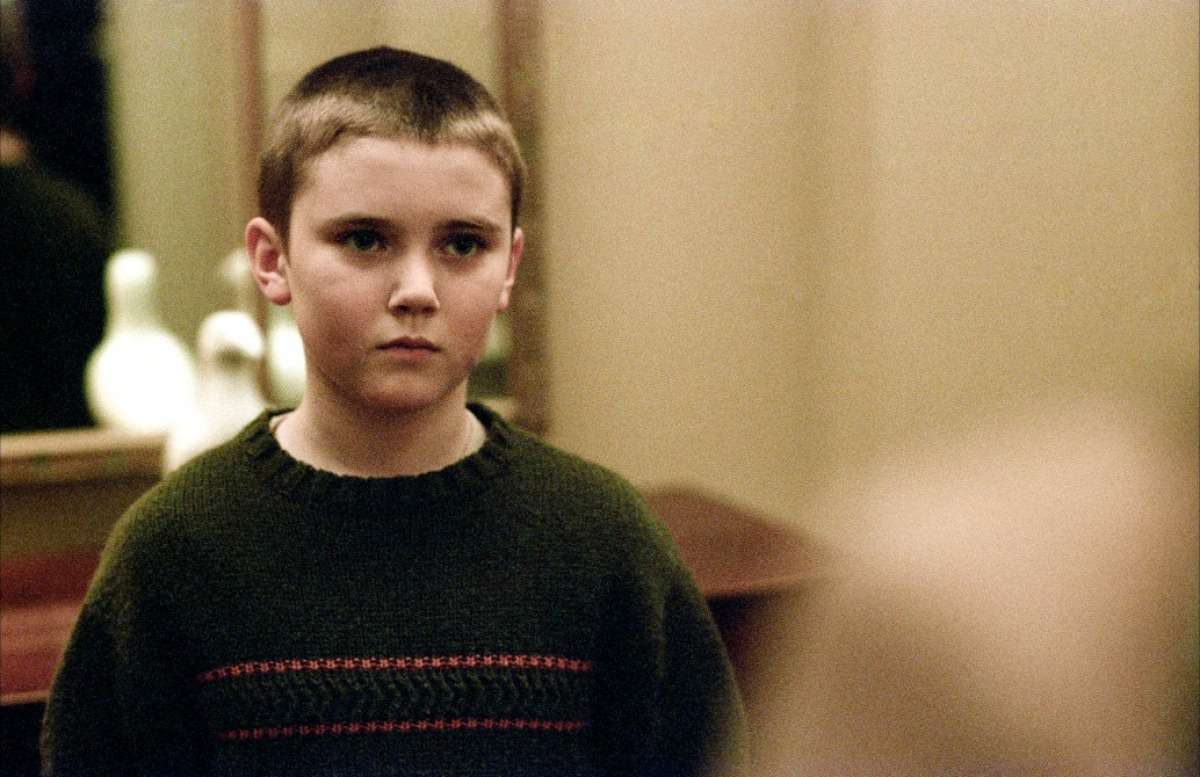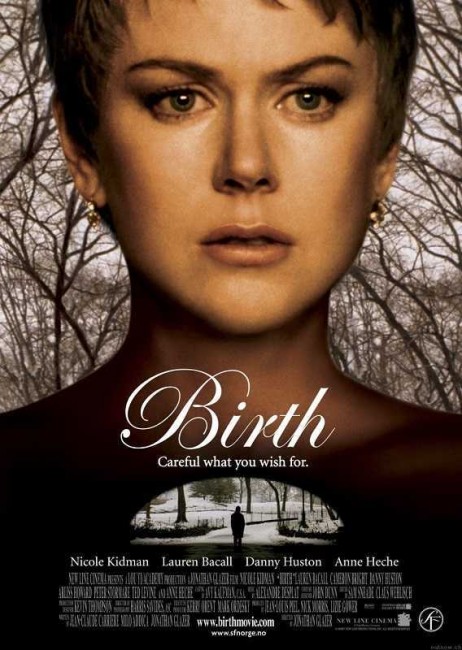USA/Germany. 2004.
Crew
Director – Jonathan Glazer, Screenplay – Milo Addica, Jonathan Glazer & Jean-Claude Carriere, Producers – Lizie Gower, Nick Morris & Jean-Louis Piel, Photography – Harris Savides, Music – Alexandre Desplat, Visual Effects Supervisor – Tom Denenham, Special Effects Supervisors – John M. & Ronald Ottesen, Production Design – Kevin Thompson. Production Company – Fine Line Features/Lou Yi/Academy Productions/March Entertainment GmBh & Co Ltd.
Cast
Nicole Kidman (Anna), Cameron Bright (Sean), Danny Huston (Joseph), Anne Heche (Clara), Lauren Bacall (Eleanor), Alison Elliott (Laura), Arliss Howard (Bob), Peter Stormare (Clifford), Cara Seymour (Mrs Conte), Ted Levine (Mr Conte)
Plot
Anna has just announced her engagement to Joseph. At a birthday party for Anna’s mother, a young boy enters the apartment and requests to speak to Anna. He tells her that he is her husband Sean, who died ten years ago, and that he does not want her to marry Joseph. Anna throws Sean out but he continues to write letters and call her. Disturbed by this, they place the boy to the test where he demonstrates uncanny knowledge of Sean’s life and their marriage that he could not possibly otherwise know. Gradually, Anna starts to come believe that it is Sean returned from the dead. However, this leaves her with the problem of trying to work out how she could resume her marriage with a ten-year-old boy.
Birth failed to do much business when it opened, despite toplining a Hollywood A-list actress like Nicole Kidman. There were some indifferent reviews and about the only attention the film received was the usual moral voices getting on a high horse about a scene where Nicole Kidman and young Cameron Bright share a bath together (despite the fact that the scene was digitally composited rather than filmed in a real setting). Thus it is a considerable surprise when sitting down to watch Birth to discover that it is three-quarters of an excellent film. You can understand why most other critics parted ways on the other quarter but that does not negate the excellent and often mesmerising build-up.
Birth was made by the rising young British director Jonathan Glazer, who came from a background in commercials and music video and whose sole previous film was the excellent Sexy Beast (2000). Glazer’s direction is exceptional. The whole film takes place with such quiet, carefully studied composure that the results are immediately unlike anything one has seen in some time. Glazer deliberately allows the background of the film to seem stripped and soulless – be it New York’s Central Park seen in perpetual winter with denuded skeletons of trees starkly outlined against the snow; the foyers of the apartment building, which seem like the marble hallways of a mausoleum; to the beautifully lit and dressed backgrounds of the various upper-class apartments the film takes place in where the decor seems to hold cheerless affect.
The way that Glazer composes his mise en scene in light and shadow, the way he can linger for long minutes in closeup on the outward surface of Nicole Kidman’s face trembling with emotion beneath, the way that the smallest noise or twitch of movement suddenly has tremendously expressive power is something that has a bared intimacy. Birth also has a stunningly good score – a mix of original and classic excerpts – which is one of the best soundtracks that one has heard in a film in some time.

Nicole Kidman is an actress who has become a darling of awards ceremonies in recent years and seems to deliberately choose roles that play to such. I find her to be somewhat of an ice queen but this is the type of role – the upper-class woman with the composed exterior who gets to gradually thaw throughout – that she is perfectly suited to. The role here had her nominated for a Best Actress Award at the 2004 Golden Globes, although I personally found her to be far outstripped in the acting honours by eleven-year-old Cameron Bright, who gives a quite exceptional performance as the reincarnated husband. Anne Heche is also excellent in a supporting part that holds some surprises in the last act of the film.
Jonathan Glazer co-writes with no less than the legendary French screenwriter Jean-Claude Carriere, known for his collaborations with Luis Buñuel and works like The Tin Drum (1979). What I did like about the script is how it plays the premise of the film – a young boy claiming to be a woman’s reincarnated husband – with meticulous plausibility. They show the emotional effects that this would have on Nicole Kidman and the people around her, as well as paying careful attention to the problems that the consummation of such a relationship would entail (while gingerly tip-toeing around good taste).
Unfortunately, Birth is let down by its ending. [SPOILERS ALERT]. Here we learn that Cameron Bright is not the reincarnation of Nicole Kidman’s late husband but rather that he learned all about the husband’s life from reading the love letters he wrote to Kidman that, in a complicated piece of plotting, he found buried in the garden and that he then pretended to be the husband. I don’t necessarily have a problem with mundane endings but I felt that this was one that let down on the careful plausibility with which Glazer and Carriere had sketched the premise. There do also seem some glaring errors – like how the boy would know where the husband died from reading the letters that the husband had written. The most gaping plausibility hole though would seem to be the simple question of why. There are absolutely no reasons or motivation given as to why the boy would choose to conduct such a masquerade.

It is here at the ending that one realises that Birth resembles Alfred Hitchcock’s Vertigo (1958). Vertigo had James Stewart falling in love with Kim Novak who appeared to be a reincarnated woman and after her death encountering a double that may or may not be her, before a mundane ending that revealed the reincarnation to be an elaborate masquerade. Even more so, Birth resembles Brian De Palma’s Vertigo copy Obsession (1976), which had Cliff Robertson encountering a woman that claimed to be his late wife’s reincarnation, before likewise unveiling an elaborate plot of identity masquerade. All three films – Vertigo, Obsession and Birth – raise reincarnation, have people believing that someone else is a dead one returned and then come to an implausibly contrived mundane resolution.
Birth also came out the same year as Godsend (2004). Both films feature a middle-class couple being torn apart by a young boy who would seem to be the reincarnation of a dead loved one – in Godsend, it was a clone of Greg Kinnear and Rebecca Romijn-Stamos’s dead son, while here it is a boy claiming to be reincarnation of Nicole Kidman’s late husband. To reinforce the connection, the same actor Cameron Bright played the child in both films. 2004 also saw a further loved one returned drama in the indie film P.S. (2004) in which Laura Linney believes that a young student might be the reincarnation of her late love. (That too opted for a mundane ending).
It took some years for Jonathan Glazer to return to the director’s chair with Under the Skin (2013) featuring Scarlett Johansson as an enigmatic alien visitor and the award-winning The Zone of Interest (2024).
(Winner for Best Musical Score, Nominee for Best Director (Jonathan Glazer), Best Supporting Actor (Cameron Bright), Best Supporting Actress (Anne Heche) and Best Cinematography at this site’s Best of 2004 Awards).
Trailer here


